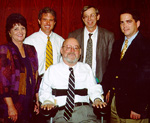$1 million available annually for spinal cord injury research
by Dick PetersonPublic Relations
South Carolina neurologists and neurosurgeons know about it.
They know about the state’s Spinal Cord Injury Research Fund, and the more than $1 million available each year for research aimed at developing a better understanding of causes and effective treatment strategies for paralysis, sensory loss, and other consequences of spinal cord injury and disease.
 Board
members not affiliated with MUSC from left to right are: Terry Peacock
of Columbia, Dr. W. Daniel Westerkam, of Columbia, Judge Charles L. Allen
of Mount Pleasant, Dr. David L. Shallcross, of Greenville and board
chairman Dr. Brian G. Cuddy, of Charleston.
Board
members not affiliated with MUSC from left to right are: Terry Peacock
of Columbia, Dr. W. Daniel Westerkam, of Columbia, Judge Charles L. Allen
of Mount Pleasant, Dr. David L. Shallcross, of Greenville and board
chairman Dr. Brian G. Cuddy, of Charleston.
But the fund’s chairman, a neurosurgeon himself, wants the rest of South Carolina’s research and clinical community to know about it too. And that includes occupational and physical therapists, nutritionists, biomedical engineers, research scientists at the laboratory bench—virtually anyone who can contribute a way to improve the lives of spinal cord injury victims through repair and regeneration, rehabilitation and education.
The South Carolina Legislature has authorized the S.C. Spinal Cord Injury Research Fund to be administered by a fund board and attached to MUSC for staff and administrative purposes. The fund will be provided by a $100 surcharge to accompany each DUI (driving under the influence) conviction in the state.
“We estimate more than $1 million a year will be available in the fund for grants and contracts to conduct spinal cord research that will directly benefit the people of South Carolina,” said Spinal Cord Injury Research Board chairman Brian G. Cuddy, M.D. “With the up to 10,000 DUI convictions we have in South Carolina each year, that $1 million is a realistic figure,” Cuddy said. “I’ve had police officers tell me that it is amazing how many people out there on the roads are completely incapacitated.”
Driving under the influence of alcohol or drugs is a major cause of auto accidents that result in permanent paralysis and death from spinal cord injury. Research financed by the fund could well be the key to unlocking the mystery of how to stop and perhaps reverse the progressively degenerative effect of trauma to the spine or head, Cuddy said. Or the fund may lead to collaborations among scientists, clinicians and therapists to return an otherwise incapacitated spinal cord injury victim to a job or a near-normal life.
Following a model introduced in New Jersey and now used in New York and Kentucky, the South Carolina Legislature authorized legislation in July 2000. Since then, a board has been formed composed of two MUSC faculty, David Griesemer, M.D., and Phanor Perot, M.D.; two specialists in spinal cord injuries, David L. Shallcross, M.D., of Greenville, and W. Daniel Westerkam, M.D., of Columbia; and two spinal cord survivors, Judge Charles L. Allen of Mt. Pleasant and Terry Peacock of Columbia.
Cuddy said others deeply involved in getting the SCI Research Fund off the ground are fund administrator J. Walker Coleman, Rosalie Crouch, Ph.D., scientific director Peter Kavilas, Ph.D., and MUSC President Ray Greenberg, M.D., Ph.D. He expressed gratitude to Union County Representative Ronald N. Fleming, Charleston Representative Harry B. “Chip” Limehouse III, and state Senator Arthur Ravenel Jr. “And of course Governor Hodges for signing the measure,” Cuddy said.
The board hopes to award the first round of research projects in April or May when the fund is expected to reach the $1 million level.
“We want these awards to be pilot money or seed money for researchers who would not be funded from more traditional sources,” Cuddy said. He explained that traditional funding agencies such as the NIH are attracted to applicants who are established in their disciplines and fund projects that peer reviewers for the agencies consider promising.
While the SCI Research Fund Board will carefully review each applicant and project before offering a grant or contract, Cuddy said that the fund is a great resource for young investigators and others with ideas and projects of merit that would not be funded otherwise.
“It’s frustrating when a patient has completed months of rehabilitation
and asks, ‘Is that all you can do for me?’” Cuddy said. “More can be done.
But we haven’t made it available, or it hasn’t been developed. We need
to encourage collaboration across disciplines and research institutions
in South Carolina, and this fund can do that in much the same way as the
Christopher Reeves Foundation is doing nationally.”